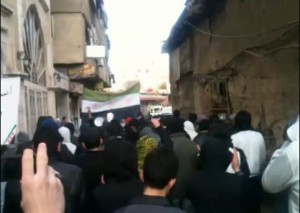Activists: Arming the Syrian Opposition is a Card in the Hands of the Big Powers

Mariam Abdullah*
(Damascus, Syria)- Since Ghayyath Matar was killed on September 6, 2011 after distributing flowers to soldiers, many Syrians who took to the streets to demand freedom realized that their revolution would not continue unarmed. The young man’s body, thrown in front of his house days after his arrest, was a sign confirming that the revolution would not remain non-violent.

Intense debates began to emerge around the wisdom of the opposition’s decision to arm itself. These discussions have now returned after members of the “Friends of Syria” coalition announced their decision to supply weapons to the opposition, questioning whether more arms will help it, or whether they are simply pawns in a larger international game that aims to prolong the war.
The Damascus Bureau asked several opposition supporters and activists from different religious backgrounds in Damascus and its suburbs about their opinions.
Qusay ,48, an employee in a private company and a participant in prominent demonstrations and funeral processions at the beginning of the uprising, said that “arming the opposition is a double edged sword.”
He believes that if the United States had wanted to end the Syrian conflict it could have done so a long time ago, but that the US views the conflict and its developments through its own self-interests. Today, it uses the idea of supplying arms to its own advantage, when it could have supported the revolution before.
“If the defecting soldiers and officers were supported to form a real national army, then the Islamists would have been neutralized, the Jihadis prevented from entering Syria, and the Qatari and Saudi money, which severely corrupted the movement, would have stopped,” he said. “If the movement had remained non-violent to a certain degree the situation would not have deteriorated this much.”
But today, Qusay sees that arming the opposition is inevitable, in order to balance the power between the two sides and to force the regime to sit at the negotiating table and offer compromises. He has his reservations though.
“First and foremost, weapons will not lead to the democratic transition that Syrians aspire to,” he said. “They may produce some changes, but democratic transformations will be delayed for a long time. Whatever comes about due to violence will only breed more violence.”
Wael, 38, is a lawyer who participated in Syria’s non-violent protests and also helped draft many statements condemning the regime. He presented many proposals tied to future constitutions. He says the opposition’s use of weapons is part of an “American-Israeli plan.”
“It’s a prelude to the inevitable coming military strike because the regime will never transfer power,” he said. “Of course arming the opposition will change the equation, but the US will not allow the opposition victory this easily, and I predict a military strike.”
Maha is a feminist activist with the Syrian Women for Democracy collective who participated in the drafting of a constitution for the upcoming transitional period.
“There must be non-violent civil activists as a counterweight to soldiers, and we hope that the situation remains non-violent because the main goal is to rebuild on all levels,” she said. “Military action against the regime is a necessary evil. The criminal nature of the regime and its inability to back down pushes us towards military resistance. Therefore I am with arming the Free Syrian Army under the leadership of Major General Salim Idriss to change the balance of power with the regime’s army on one hand and with extremist groups on the other in the future, without overlooking the importance and necessity of non-violent action.”
Among the young women active in media work, demonstrations, and local coordination committees that the Damascus Bureau met with, Rand reiterated fears that American weapons would lead to internal struggles among the opposition’s armed factions in a race to acquire the best weapons. She is also wary of the conditions that Americans place on this assistance, asking “even though we know that the US does not want its weapons in the hands of extremists, on what basis will they decide who is an extremist or a terrorist, and will the weapons really move from the hands of the leaders to those of the fighters?”
“We hear a lot of stories of corruption and of weapons concealment, so who can guarantee anything?” she continued.
Rand is also worried that “the regime will not fall militarily, so weapons will not be what ultimately what decide the conflict, though they might exhaust some of the foreign fighters present on Syrian soil, such as Hezbollah, Iran, and Iraqi forces.”
Rand also expressed fears that further arming the opposition will be used as a pressure point by the west to push Iran on its nuclear project.
Mustafa, a media coordinator in one of the factions of the Free Syrian Army and a participant in the non-violent demonstrations in Jobar and Mazze, sees a positive side to the decision to supply weapons: more powerful backers of the Free Syrian Army might pressure members of the regime to sit at the negotiating table and accept a transitional period without President Bashar Al-Assad.
Mustafa said that distributing weapons fairly among opposition groups may mitigate the period of chaos following the fall of the regime, since the opposition’s military leaders are akin to the Ministry of Defense. But he also had his doubts about the intentions of the weapons’ providers.
“Ultimately all this serves American interests in the region,” he said. “Delaying the delivery of weapons is also part and parcel of this. This is what dampens the dreams of the revolution.”
Many in Damascus are still waiting for the implementation of the decision to supply weapons to the opposition with trepidation and fear of a storm that will only increase the violence Syrian citizens are witnessing.
*Mariam Abdullah is a pseudonym for a journalist living inside Syria.
